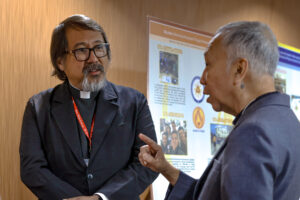By Haniel Andrea V. Mizukami | July 25, 2025
Pen Never Falters: Campus Press in the Midst of Oppression
MABUHAY ang malayang pamamahayag! — Today, we commemorate the National Campus Press Freedom Day as per Republic Act No. 11440, a law enacted under the Duterte administration—ironically, an era where media and the press experienced extreme suppression. But behind every picture, written article and headline are student journalists who fearlessly seek the truth, unwaveringly defend the press, and are committed to serving the student body and the nation relentlessly.
Let July 25 remind us about the dedication of these notable student journalists who made a lasting legacy and carried their unwavering passion until the end. From Hilao, Sarmiento to Supelanas, they have proven that student journalism remains relevant and timely—even across generations as they take part in our history.
Liliosa’s Lasting Ink
Known for her essay “Democracy is Dead in the Philippines,” Liliosa Hilao was a Bikolana Activist and student journalist from Bulan, Sorsogon. During the regime of Marcos Sr., she was the Associate Editor of Hasik, the official school publication of the Pamantasan ng Lungsod ng Maynila. She was known for writing fearless articles during martial law, as she couldn’t physically be present at rallies due to her asthma and allergies.
According to “Bansay,” a Bikolnon biography series published by the Ateneo de Naga University in 2017, 23-year-old Hilao became the first recorded political prisoner to die in detention during martial law in 1973. Her family believed that she was killed less than 24 hours after her arrest in Camp Crame.
Ditto’s Unwavered Legacy
“Kung di tayo kikibo, sino ang kikibo? Kung di tayo kikilos, sino ang kikilos? Kung hindi ngayon, kailan pa?” is a famous phrase from martial law martyr, Ditto Sarmiento, in his 1976 editorial. He was the Editor-in-Chief of the Philippine Collegian, the student publication of the University of the Philippines–Diliman, under the tyranny of the Marcos Administration. Sarmiento challenged the administration by defying the policies made by the late Marcos Sr. on how any form of criticism can subject you to jail or worse, death.
In 1976, he was arrested by the regime, wherein his health deteriorated quickly in his seven months in prison. He passed away over a year after his release.
DEEfending the Oppressed
Jhon Isidor “Dee” Supelanas was a transwoman activist and an alumna of the University of the Philippines–Cebu (UPC). Supelanas was known to be a student leader who dedicated her life to uplifting the voices of the youth. In 2018, she was a student journalist in the Nagkahiusang Kusog sa Estudyante (NKE), UPC’s official student publication. In 2019, she served as the College Representative to the UP Cebu Student Council (USC) for two years until later as the Chairperson.
She advocated for education, LGBTQIA+ rights, and democratic freedom. She led campaigns for student welfare and academic freedom, disclosed by the Tug-Ani, UPC’s official student organ.
It is also worth mentioning that she was an executive member in reviving Anakbayan Cebu and also served as the spokesperson for Kabataan Partylist in Cebu.
On April 27 of this year, she was one of the seven people who were killed by the military in Barangay Tapi, Kabanlakan City. They were suspected to be a part of the New People’s Army (NPA) and are allegedly involved in an extortion scheme in raising money from candidates campaigning in areas under the group’s influence to fund their activities. But even so, Supelanas was remembered as the “Defender of the oppressed,” as she continued to fight for inequality and systematic oppression until her last breath.
Empower Press Freedom
Press freedom in the Philippines may have been continuously upheld, but oppression and fear still linger in the country. The College Guild of the Philippines reported that there were a total of 206 Campus Press Freedom Violations reported to the Commission on Human Rights throughout 2023 to 2024. This includes 58 cases of censorship, 35 administrative interventions, and 37 withholding of funds. For this year, the Reporters Without Borders stated that the Philippines ranks 116th out of the 180 countries in press freedom, the highest it has been for the last 21 years. But in truth, the rankings are still relatively low.
Student journalists have fearlessly written stories that tell the truth and have continued doing so even if they are being oppressed for holding the administration accountable. They defied all odds, and while there were differences in situations due to different timelines, one thing remains the same: they all have the passion and advocacy to fight for our democratic human right.
And as we commemorate this day, THE BEDAN HERALD joins in as we remember the dedication of student publications in championing the voices, carrying out investigations, and expressing diverse standpoints of everyone in the institution and beyond.
Defending campus press freedom isn’t only about protecting student journalists, but also preserving the truth that the public deserves.
Volume 31 | Issue 1




